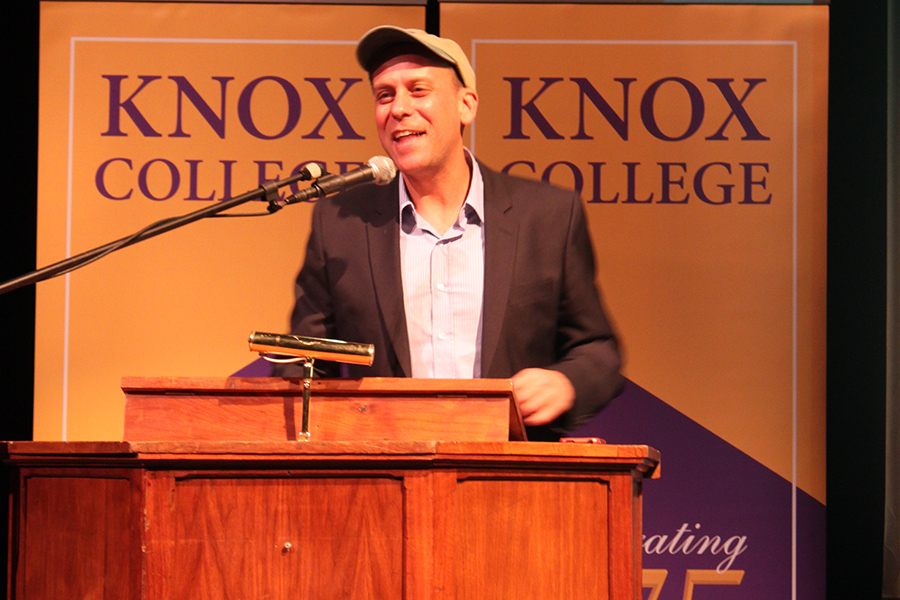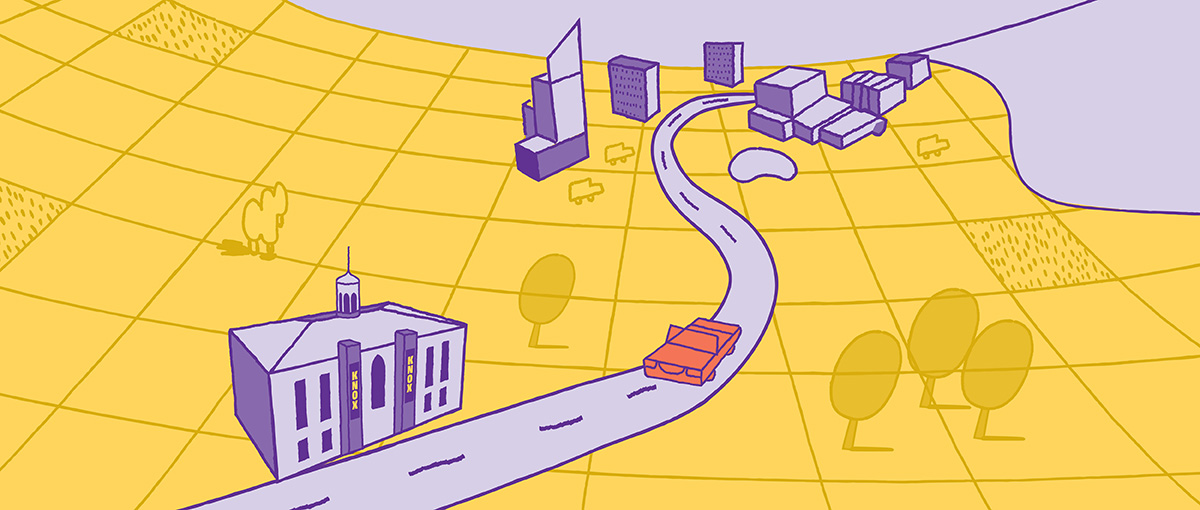

Environmental Writer Paul Greenberg Speaks at Knox
Author of 'Four Fish' delivers EquiKnox sustainability lecture
Article by Stephen Danilovich '14
Photography by Mia Sol del Valle '15 and Hongyu "Sophie" Zhou ‘14
Paul Greenberg, one of the nation's leading environmental thinkers, came to Knox College to talk about the future of fish and fish-farming in the EquiKnox Lecture on Environmental Sustainability. An environmentalist and fishing enthusiast, Greenberg gave a convincing account of the "race to domesticate" fish and the relationship humans have with the four fish types we commonly eat: salmon, cod, sea bass, and tuna.
The April 16 lecture, titled "Four Fish: The Future of the Last Wild Food," was framed around Greenberg's book, which won the James Beard Award for Writing and Literature and is a New York Times bestseller.
Greenberg regularly writes for the New York Times Magazine, and he has been a National Endowment for the Arts Literature Fellow and a W.K. Kellogg Foundation Food and Society Policy Fellow.
In his lecture at Knox, Greenberg explained that within the next 10 years, farmed fish will surpass wild fish in the marketplace for the first time in history.
"That's an epic, epic shift," he said.
The question of what species we should farm -- as well as what species we shouldn't farm -- is becoming increasingly important, he said.
Greenberg's lecture covered the four types of fish, or "flesh archetypes," that have been most common in the history of our fish consumption. He described them as: pink and succulent fish, such as salmon; white and flaky fish, such as cod; more substantial and meaty white fish, such as sea bass; and steak-like fish that can be grilled, such as tuna.
These preferences have guided our choices in fishing, according to Greenberg's research, and they are crucial when we consider what species we should domesticate.
"With those four archetypes of flesh, and with the half-domestic, half-wild (fish in the market), I realized that this was a way to go forward into the world and to start looking at the oceans -- where the oceans were going and where they had been," Greenberg said.
Looking at the history of fishing salmon, cod, bass, and tuna, Greenberg analyzed how fishing habits have affected the wild population of these fish species. Overfishing, dam-building, and habitat destruction have all contributed to the rapid decline of salmon, cod, bass, and tuna populations in the oceans.
Ocean 'Still a Very Vital Place'
"While it's easy to go down the depressing, environmental, destruction-of-everything road, it's important to remember that the ocean is still a very vital place. It's still an engine of food for the world," Greenberg said. "The question then becomes: What do we do going forward? Do we continue to catch lots of fish, or do we grow lots of fish?"
Nearly 300 people attended Greenberg's lecture and the sustainability fair that took place immediately before and after he spoke. The fair featured displays from 10 student and community environmental organizations.
One of the many Knox students at the lecture was sophomore Nora McGinn from Peabody, Massachusetts, who read Greenberg's Four Fish as part of her "World Resources" class with Visiting Assistant Professor of Environmental Studies Nic Mink.
"Paul Greenberg is one of America's most influential sustainable resource thinkers," McGinn said. "I think bringing Greenberg to Knox was a great opportunity and a great way to kick off Earth Week this year."
McGinn said she was impressed that the lecture attracted so many people from beyond the immediate Knox community. "I spoke with a man who was from the Quad Cities, who had previously read Four Fish with a book club, and had coincidentally heard about the lecture!"
Sophomore John Bergholz, from Oak Park, Illinois, attended the lecture because he believes "knowing where food comes from and how it is produced is an important part of being a consumer, especially when it comes to fish."
"It was exciting to see such a big name on campus," Bergholz added. "Increased awareness of where our food comes from is always a good thing."
Class Discussions and Sustainable Seafood Dinner
While on the Knox campus, Greenberg also met with students in environmental studies, journalism, and English classes for more in-depth discussions about his research and book.
After the lecture, Knox College Dining Services offered a "Sustainable Seafood Dinner," which featured three of the fish that Greenberg researched: salmon, tuna, and cod.
More than 400 people attended the dinner, said Helmut Mayer, director of dining services. They included students and faculty from Augustana College and Monmouth College, whose meals were sponsored by Knox students donating meal swipes from their dining plans.
Mink said he invited Greenberg to Knox because of how well his students have responded to Greenberg's book.
"I've been assigning the book in my ‘World Resources' class the last two years, and it's always among the most popular books that I assign students -- in any of my classes," Mink said. "Students rave about how Four Fish makes them consider their relationship to the environment in new ways."
'Widespread Interest' in Sustainability
Mink was impressed with the number of people who attended Greenberg's presentation.
"As someone who has attended a lot of academic talks, those numbers are astounding," Mink said. "They show the widespread interest in sustainability on campus and in the region. They also show that wise stewardship of our Earth's resources is something that we can all agree on."
Greenberg's lecture was sponsored by several groups. They include the President's Task Force on Sustainability, Eleanor Stellyes Center for Global Studies, Environmental Studies Department, English Department, Finley Fund, and the Journalism Program's Joe W. Morgan Fund. They also include several Knox student organizations: the Alliance for Peaceful Action, Friends of Green Oaks, KARES, Garden Club, Knox College Green Fee, Phi Gamma Delta, and Student Senate. The Book Nook Club of Galesburg also was a sponsor.
Published on April 25, 2012

